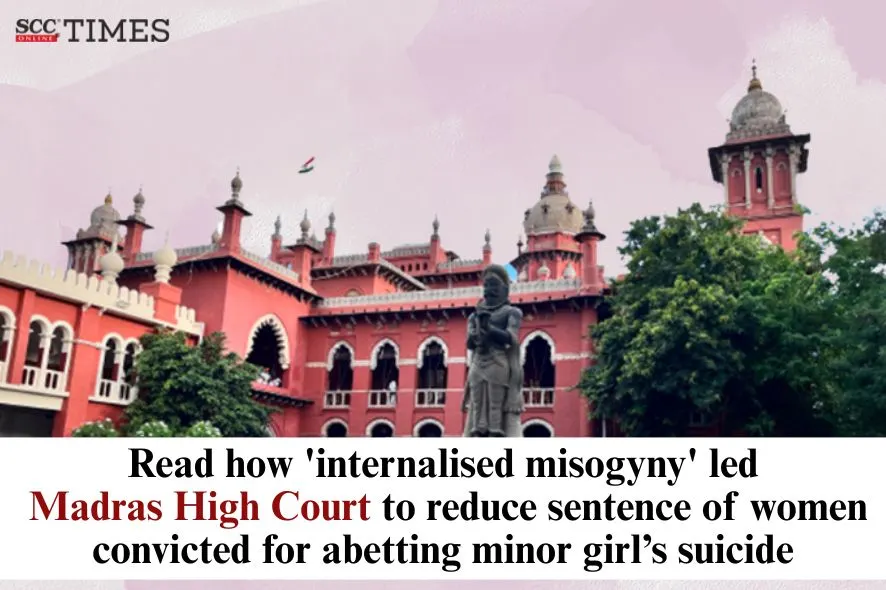Madras High Court: In a criminal appeal filed under Section 374(2) of the Criminal Procedure Code, 1973 challenging the judgment of Trial Court dated 21-7-2016, wherein the appellants were convicted under Section 305 of the Penal Code, 1860 (‘IPC’) and sentenced to three years of rigorous imprisonment and a fine of Rs. 2,000 each, D. Bharatha Chakravarthy J., observed that the appellants, being ordinary domestic workers and daily wagers with no social influence, would not weaken the deterrent effect on society by serving a shorter prison term. Thus, highlighting internalised misogyny and considering the appellants’ remorse, socio-economic status, and prior imprisonment as mitigating factors, the Court reduced their sentence to the period already undergone.
Background
The appellants were accused of abetting the suicide of a 15-year-old minor girl (victim) who had an affair with their nephew aged about 19 years. The relationship between the victim and the nephew was initially opposed by the nephew’s parents but was later accepted, with marriage arrangements underway. However, the appellants disliked the marriage plans. On 18-8-2011, the appellants came to the doorstep of victim’s house, hurled sexually colored remarks, and specifically told her to commit suicide. Unable to bear the scolding, victim set herself on fire and subsequently on 2-9-2011, she died due to her burn injuries.
Initially, the case was filed under Section 309 IPC but following the victim’s death, the case was altered under Section 305 IPC and charges were framed against both the appellants. The Trial Court, relying on the victim’s dying declaration and supporting testimony from multiple witnesses, concluded that the prosecution had proved the case beyond reasonable doubt. The Trial Court stated that the appellants used harsh, sexually charged language and issued serious threats that directly drove the minor to commit suicide. As a result, the Trial Court convicted the appellants under Section 305 IPC and sentenced them to three years of rigorous imprisonment along with a fine of Rs. 2000 each. Thus, aggrieved by the Trial Courts order, the appellants filed the present appeal.
Analysis and Decision
The Court found the conviction of the appellants under Section 305 IPC to be just and thus, upheld it. While acknowledging the offence as heinous and punishable by death, life imprisonment, or up to 10 years with a fine, the Court proceeded to examine the appropriate sentence. The Court referred to Shailesh Jasvantbhai v. State of Gujarat, (2006) 2 SCC 359, wherein it observed that, “in operating the sentencing system, law should adopt the corrective machinery or deterrence based on factual matrix. By deft modulation, sentencing process be stern where it should be, and tempered with mercy where it warrants to be.”
The Court noted that although the appellants acted wrongfully by admonishing the victim instead of the nephew, despite being from the nephew’s family. However, it considered this as a mitigating factor, noting their behaviour was influenced by internalised misogyny. As they were conditioned to question the female without realising, they themselves were the victims of such a mindset. In doing so, they harmed the victim and made themselves liable for punishment. The offence occurred in =a part of South Coimbatore, a metropolitan area and the appellants being an ordinary women working as domestic helpers and daily wage earners, were socially unrecognised and their shorter imprisonment would not undermine the deterrent effect on society.
Having shown remorse, faced full legal proceedings, and already served 90 days and 83 days respectively in custody, the Court emphasized that the appellants’ further imprisonment was not necessary for deterrence or reformation in these exceptional circumstances. Thus, the Court modified their sentence to the period already undergone. However, the Court opined that the appellants should continue to feel the pinch of their actions, thus increased the fine from Rs. 2,000 to Rs. 20,000.
[Kayar Nisha v. State of T.N., 2025 SCC OnLine Mad 3291, decided on 2-7-2025]
Advocates who appeared in this case :
For the Petitioner: J. Franklin, Advocate
For the Respondent: J.R. Archana, Government Advocate (Crl. Side)



